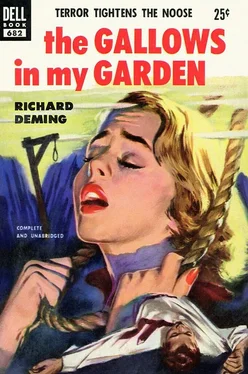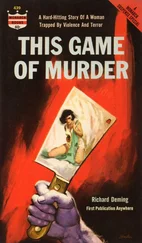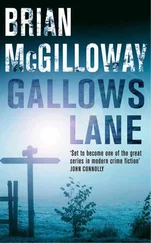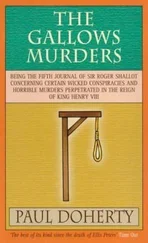As though minstrel performers were a common occurrence in her life, the registration nurse recorded information without exhibiting a sign of curiosity. But when an orderly had wheeled the wounded man away to surgery, she directed us to a mop room containing a deep sink, apparently used for filling buckets.
“You two would ruin the public washroom,” she told us. “Wait here a minute.”
In a few moments she returned with a bar of laundry soap, a handful of rags, and two towels.
A half hour later our clothing was still dirty, particularly mine, but at least we were again recognizable as human beings. Mouldy dignifiedly waited until I was through cleaning up before he began, still maintaining his aloof silence.
Back in the lobby we found two state troopers and the town constable waiting for us. We spent another half hour explaining things to them, with me doing all of the talking, and ended by phoning Warren Day’s rooms long-distance. The constable let me talk to him.
Though it was Sunday evening and Day hated to be disturbed off duty, surprisingly he was not in a churlish mood. He was in one of his pixie moods though, which was just as bad, for his sense of humor takes a practical bent and he was quite capable of asking the constable to hold us overnight if it occurred to him that would be a funny joke. Recognizing the mood, I explained what had happened without needling him in my usual inimitable manner, and asked him to vouch for us to the town constable.
“How do I know you didn’t shoot the cop?” he asked.
I laughed heartily. “You’re a card, Inspector.” Then adroitly I changed the subject. “This tall hood definitely tried to pump me about where I had hidden Grace Lawson. And I forgot to tell you there was another attempt on her life this morning. I’m afraid your theory that brother Don was pulling the attempts on Grace is full of holes.”
In spite of his blind adherence to his own theories, once Warren Day is definitely convinced he is wrong, he makes no bones about it.
“I guess it is,” he admitted. “We’ll throw out a net for your two playmates. Give me their descriptions.”
I gave him an item-by-item description of both assailants, speaking slowly so that he could write it all down.
“The squat one is wounded,” I told him. “It may be only a flesh wound, and a bandage might not show under his coat. But on the other hand, I may have gotten a bone. Have your men watch for either a guy with his right arm in a sling, or with a stiff right arm.”
“All right,” Day said. “I’ll phone this in to headquarters. Soon as you get away from there, get down to the criminal records and identification department and see if you can pick out their pictures. If they’re on file, we’ll put photographs in the hands of every man on the force.”
“Check,” I said, and turned the phone over to the constable.
Even after Warren Day vouched for us, we were held another half hour until the wounded trooper regained consciousness and was declared out of danger. His evidence did little to corroborate our story, since in the dusty confusion he had no idea who had shot him, and only knew he had been chasing a yellow convertible for a traffic violation.
It was at this point that Mouldy broke his reproachful silence in order to explain his part in the affair. It took the combined interviewing experience of the constable, the two state troopers, and myself to get a coherent story out of him, but we finally managed it.
Having been ordered by Fausta to watch over me, my ordering him off had not discouraged Mouldy. He simply circled the block, picked me up again, and followed. How he came to realize the black sedan was also following me was not clear, and how he prevented its occupants from detecting his gaudy convertible even less clear, but somehow he managed to stick to the sedan’s trail.
He even showed a flash of normal intelligence by going on by when the sedan turned into the mill road, but in his eagerness to swing around and come back again, he reverted to type. Two hundred yards beyond the mill road was a traffic signal at an intersection with another main highway. Mouldy picked that spot to make a U-turn through a red light, causing a semi-trailer to swerve around him, which in turn drove the state trooper and his motorcycle into a ditch. The cop was chasing Mouldy to give him a ticket when he ran into all the gunfire.
“Let me see your license,” one of the troopers requested when Mouldy finished his tale.
“Do you have to have a license?” Mouldy asked.
They were all three pulling out their traffic ticket books when it developed Mouldy had thought they were talking about a license to make U-turns, and produced a perfectly valid driver’s license.
I think they were relieved to let us go.
Although he still professed not to understand why I had slugged him, Mouldy’s dignified aloofness had evaporated by that time.
“If we ever have another war, I’ve got the perfect secret weapon,” I told him on the way back to town. “I’m going to give you to the other side.”
“I got you out of your scrape, didn’t I?” he asked.
I was forced to admit he had.
I instructed Mouldy to drive to police headquarters. Together we went inside and proceeded directly to the criminal records and identification department. The night-duty clerk, a big blond cop in his early twenties who wore a crew haircut, was reading a love-story magazine.
“Inspector Day phoned,” he said. “I’ve been expecting you. Let’s just check those descriptions again.”
As I reeled off each item of description, he converted it to code on a couple of machine file index cards. When both cards were completed, he took them into the room where the Bertillon files were kept. In five minutes he was back with two stacks of photographs, more than a hundred photos in each stack.
I tackled the pile denoting men of the English lord’s general description, while Mouldy skimmed through pictures of short, squat and dark criminals. Greene found his man a quarter way through.
“Jeeze!” he said. “This baby is quite a character!”
I took the card from his hand. It was my friend Harry, all right, both front and profile, and had been taken at San Quentin five years before. His full name was Harry Sommerfield, but he was more commonly known as Harry the Horse for reasons not explained in the file. He was wanted in New York for prison break, in Michigan for arson and homicide, and in Illinois for just homicide. The FBI also wanted him for income-tax evasion.
Ten minutes later I found my man. His name was Thomas “Dude” Garrity, and his record made Harry look like a Sunday school teacher. Apparently he had never made a graven image, but aside from that he had managed to break all of the ten commandments at least once, and to have invented a couple of new crimes Moses must have neglected to copy down.
While we pored over the pictures, the blond cop had again become absorbed in his magazine. I jerked him back from the world of romance to the dull routine of real life by tossing the two cards in his lap.
“Those are the lads,” I told him.
“Fine,” he said, then glanced at the typed notations on the backs of the cards and pursed his lips in a silent whistle.
“You really picked a couple of tough ones,” he said. “We’ll get it out on the air tonight, and by morning we’ll have pictures for the whole force.”
“Good,” I said. “Leave a note for Inspector Day that I’ll see him or phone him sometime tomorrow.”
When Greene dropped me in front of my flat, I borrowed his army automatic and holster, since my P-38 was still in the possession of the two gunmen. Standing on the sidewalk, I checked the load by pulling back the slide. It locked open, indicating emptiness.
Читать дальше












